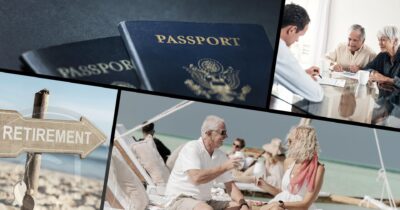

Retirement planning today is no longer about reaching a certain age; it’s about reaching a certain level of freedom, security, and flexibility. Today’s retirees are living longer, traveling more, and expecting far more from their post-career years than previous generations. Yet at the same time, the world has become increasingly uncertain.
Over the last decade, the traditional idea of retirement: staying in one place, relying on a single pension or savings account, has been challenged by the global economy. Across the globe, retirees are facing the same challenges:

Inflation has reached multi-decade highs in many regions, eroding purchasing power faster than ever. Real estate and living costs have surged across Europe, North America, and parts of Asia. Meanwhile, rising taxes and unstable currencies make it harder to preserve wealth over the long term.
In this new environment, keeping all your assets, income, and tax exposure in one country has become a risky decision. Economic crises, political shifts, and tax reforms can significantly impact your lifestyle and long-term financial health.
This is why an increasing number of high-net-worth individuals are looking beyond borders, seeking ways to diversify their assets internationally and gain access to stable, low-tax, high-quality-of-life destinations.
Keeping all your wealth and retirement plans tied to one country has become risky.
Economic shocks, political shifts, or sudden tax reforms can change the rules overnight. By contrast, diversifying your assets and legal status internationally gives you options, as they are the ultimate form of security.

Investing abroad allows you to:
International diversification isn’t just about financial gain; it’s about control, freedom, and peace of mind. This is what many experts call the “Retirement Second Plan”: a strategic backup that ensures your future isn’t dependent on one government, one economy, or one passport.
When it comes to relocating or diversifying internationally, two main solutions exist:
Residency by Investment programs offer the right to live, work, and retire in another country by making an eligible investment (often in real estate, national funds, or local companies).
It offers flexibility, access to quality healthcare, and, in some cases, a path to permanent settlement or citizenship after a few years, while maintaining your current citizenship.
Citizenship by Investment programs, on the other hand, grant a second passport and full rights of nationality, a powerful tool for global mobility and long-term security.
It offers the freedom to live, retire, and invest anywhere without depending on your country of origin. Beyond visa-free travel, it brings access to new financial systems, inheritance benefits, and stability that can be passed on to future generations.

Across the world, a growing number of people are discovering a harsh truth: the retirement systems they’ve trusted for decades are no longer enough.
According to the OECD (Organisation for Economic Co-operation and Development), public pension funds are under growing pressure in nearly every developed economy. Aging populations, shrinking workforces, and rising healthcare costs mean that many governments simply cannot sustain the same level of benefits they once promised.
In 1980, the average retiree spent about 12–15 years in retirement. Today, it’s 25 years or more. Maintaining the same lifestyle for two or three extra decades requires far more capital, and the costs keep climbing.
Even in countries considered “affordable,” healthcare, housing, and daily living expenses are rising faster than retirement income. In the U.S. alone, inflation has reduced the real value of pensions by over 15% in just three years. In Europe, retirees are spending nearly 40% more on essential goods and services than they did a decade ago.
Some countries have adapted better than others. Nations like Switzerland, Singapore, and New Zealand rank among the top for retirement security, offering stable currencies, strong healthcare systems, and predictable fiscal frameworks.
By contrast, retirees in regions with high inflation, political instability, or heavy taxation face a much tougher road.
This global imbalance has given rise to a new trend: retirement migration.
Increasingly, individuals are choosing to relocate. Not just for lifestyle reasons, but to protect their wealth and enhance their quality of life.

By diversifying geographically, you:
This is why forward-thinking investors are creating international retirement portfolios combining financial diversification with citizenship or residency programs to secure their mobility, privacy, and stability.
At Citizenship Invest, we empower individuals and families to build that freedom to plan for a future without borders.
Through our carefully selected Citizenship and Residency by Investment Programs, clients can secure:
From the Caribbean to Europe and the Middle East to the Pacific, our global portfolio allows investors to choose the plan that best fits their lifestyle and long-term goals. Whether that means a peaceful retirement destination, a stronger passport for global mobility, or a diversified financial safety net.